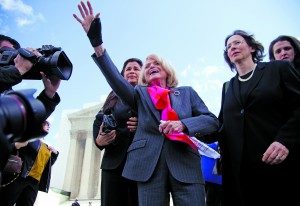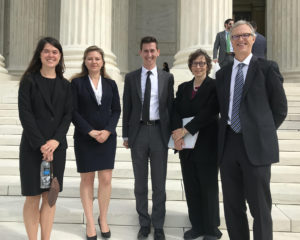Arguing at the Court: Pam Karlan Discusses Zarda and the LGBTQ+ Win for Employment Rights
On Monday, June 15, 2020, the U.S. Supreme Court released its landmark decision BOSTOCK v. CLAYTON COUNTY, GEORGIA , confirming that Title VII of the Civil Rights Act of 1964, which prohibits employment discrimination “because of sex,” applies to discrimination based on sexual orientation and gender identity. The Stanford Supreme Court Litigation Clinic represented Donald Zarda, a skydiving instructor who was fired after telling a customer that he was gay. The following is an excerpt from an upcoming Stanford Legal interview in which Pamela Karlan, co-director of the clinic, discusses the decision and case, which she argued before the Court on October 8, 2019. This episode of Stanford Legal, co-hosted by Stanford Law Professors Pam Karlan and Joseph Bankman, will air on SiriusXM channel 132 on Saturday, June 20, and be posted to most podcast platforms soon after.
Joseph Bankman: Today, the Supreme Court came out with a decision in a case that you argued before the Court back in October and that your students in the Stanford Supreme Court Litigation Clinic worked so hard on. And it is a big win for you and the members of the LGBTQ+ community and their allies. Congratulations Pam.

Pam Karlan: The Supreme Court decided six to three in a trio of cases that were decided together. One of the cases was ours—the Stanford Supreme Court Litigation Clinic was co-counsel, along with Greg Antollino and the ACLU, representing Don Zarda’s estate. The reason this is a decision about the LGBTQ+ community is that there were two cases about gay people and one case about transgender rights and the Supreme Court issued one decision resolving all three.
I understand you’re hard at work on another Supreme Court case.
Yes, we’re filing a petition for certiorari tomorrow in another case. You know, the work never ends.
Well, again, congratulations. Let’s talk about the cases our students and you worked on. Zarda was a skydiving instructor.
Yes. Our client was a man named Donald Zarda, who tragically died midway through the case in a BASE jumping accident. But he was strapped with his front against the back of the student as they jumped out of the plane. And as you said, Joe, he said ‘don’t worry, I’m gay, and I have a husband at home to prove it.’ A couple of days after the jump, which went well, the boyfriend of the woman he had been jumping with complained to Zarda’s employer. He was then fired, and he brought a lawsuit under Title VII of the Civil Rights Act of 1964, which says that you can’t fire an employee or otherwise discriminated against him or her because of that individual’s sex. He said he was fired for being gay, for not conforming to the expectation that men will be attracted to women and not to other men, and he wouldn’t have been fired if he had been a woman attracted to men. He lost in the trial court so the case went up to the court of appeals. The Supreme Court agreed to review the case, along with the cases of Aimee Stephens and Gerald Bostock and we agreed with Mr. Bostock’s counsel to combine our arguments together and I was lucky enough to be selected to do the argument.
Title VII has always been a huge piece of legislation that protects against discrimination not only because of sex but also because of race, national origin, and religion. And the question here is how to interpret that “sex” term. Does that also include not firing somebody because of sexual orientation, which wouldn’t be there if it weren’t for their attraction to the same sex or, as in one of the cases, you are transgender.
I should just mention briefly about the transgender case that it was a separate case and the Supreme Court combined them for purposes of the opinion. In that case, Aimee Stephens was a transgender woman who tragically died two weeks ago. And her employer fired her when she announced that she was transitioning. She was represented by the ACLU, which was also our co-counsel in the Zarda case. And yes, as you say, the statute says you can’t discriminate against somebody on the basis of sex. In 1964, sex was added very late to the list of race, national of origin, color, and religion. And there’s some dispute about why exactly it was added. Some believe that it was added in part because a Southern representative wanted to make sure that black men wouldn’t get an advantage over white women in the job market. And if you forbid race discrimination, but you don’t forbid sex discrimination, then you don’t protect women.

What did sex mean in this statute, the Civil Rights Act? In 1964 people weren’t thinking about sexual orientation and surely not thinking about transgender issues, something argued in the dissent. How did you get to the conclusion that it is covered?
So the way we get there is by looking at the text of the statute, which is a different question than asking, “what did the people who passed the statute think the consequences of the statute would be?” As you look at the words that were written down and hear the word “sex,” we all agree—the plaintiffs and the defendants in these cases—that sex is about whether somebody is male or female. Let’s take Don’s case as an example. Don is a man who was fired for being attracted to men and that is something that a woman wouldn’t be fired for. And it’s true that in 1964 if you had asked the members of Congress “Are you trying to protect gay people from discrimination?” they all would have said “No, we’re not trying to do that.” But the words they used have that natural consequence. And here the words of the statute cover firing somebody for being LGBT, and that’s what we’re governed by—the words.
And this is how Gorsuch’s opinion defines the term.
That’s right. And I think if you read Justice Gorsuch’s opinion, you’ll see that this is why it does follow logistically from the words. Mr. Zarda was fired for doing something—for being attracted to men—that his employer would not have fired a woman for doing. Aimee Stephens was fired by her employer because her birth certificate said she was male. If her birth certificate had said she was female, she would not have been fired. And we say it’s just a simple logic from a definition of the word that everyone agrees on.
It’s what we call in law “but for” logic. But for someone’s sex in all of these cases, they would not have been fired.
And Title VII actually goes a little bit beyond that, just as Justice Gorsuch alludes to in his opinion. But because it didn’t matter to the result, he didn’t spend a lot of time on it. But Titled VII was amended after the Price Waterhouse decision to make it very clear that if sex is a motivating factor, even if it isn’t the “but for” factor, the employers decision violates Title VII.
Were you surprised that Gorsuch and Roberts joined the more liberal justices or did you think—based on their overall philosophy and in particular on their reaction in oral argument—that you had them with you?
So, during the argument Justice Gorsuch was a really active questioner and at one point, I’m not sure if it was in my part of the argument or when David Cole who represented Aimee Stephens was arguing, he said that looking at the text, you have the stronger of the arguments, but should we think about the consequences as well? And so I was quite optimistic that we were going to get Justice Gorsuch’s vote because he has spent a lot of time talking about himself as a textualist. I was gratified about the Chief Justice’s vote, but I didn’t come out of the argument confident that we would get his vote because the Chief Justice is, I think, somebody who also focuses a lot on the intent of the legislature, in a way, and he’s not as pure a textualist as, for example, Justice Gorsuch is. But I was grateful for both of their votes because I think it shows that when the text is really clear, as it was here, even justices whose policy preferences might be different will vote on the text.
There is one view of the court that they vote on their politics and certainly people that have that view can make some good arguments on behalf of it. But people who spend their life arguing before the Court don’t generally feel that way. And I don’t think you could give an effective argument at the Court if you thought it was all political nonsense. But this is a case that can’t be explained simply on politics, I would guess.
I think that’s right, although I will say that the politics are, you know, quite interesting. The New York Times had some polling data about this showing that about 70 something percent of Republicans believe that you shouldn’t be able to discriminate against people in employment based on their being lesbian, gay or bisexual and 90 percent of Democrats believe that and 80 something percent of independence believe that. So whatever people’s personal views about the morality of sexual orientation, they recognize that that’s not relevant to whether people can perform their jobs.

So, you get to keep your job whatever your sexual orientation.
Yes. I think most people would be shocked that wasn’t already the case. I think most Americans thought you already were protected—everywhere in the country—on this.
And it’s notable maybe that even the dissent, at least Kavanaugh’s dissent, starts by saying justice is served by protecting members of the LGBT community.
Yes, I think, Justice Alito dissent doesn’t quite go that far but Justice Kavanaugh’s does. I think one of the things that’s interesting about this case, and David Cole made this point in his argument explicitly as well, is that the Supreme Court courtroom was filled with LGBT lawyers—good lawyers who make good arguments. And the idea that those lawyers could have been fired from their jobs because of what they do and whom they love is an argument that would have seemed very strange to the Supreme Court.
In Gorsuch’s opinion he mentions the bathroom issue that seems important to some people. Can you tell us about that?
So at the oral argument there was a huge number of questions about, well, what does this say about single sex bathrooms. And we thought that was a distraction. And of course in the lesbian and gay part of the case, which is my part of the case, it’s really hard to understand what the bathroom issue is about at all because gay men have been using the men’s room and lesbians have been using the women’s room, and male bisexuals use the men’s room and female bisexuals use the women’s room, and nobody has ever suggested that there should be anything different about that. So it was a little bit of a puzzle as to why the justices seemed so interested in bathrooms. We don’t think about bathrooms that much when we think about Title VII. And of course, in Justice Gorsuch’s opinion, he says, look, the bathroom issue is not the issue before the Court today. And so, down the road somewhere, perhaps people will be arguing about bathrooms, but not now. And I honestly don’t see in the sexual orientation case even any argument about bathrooms. I mean, you know, there’s never been a suggestion that people are segregated in their bathrooms on the basis of their sexual orientation.
That’s right. And even with the transgender cases, it’s hard to see that that’s a separate issue. So who have you been hearing from today? It’s such a big win.
Oh, lots of people, from co-counsel and the people who helped us along the way congratulating us and from other members of the Supreme Court bar and former students and the students on the team and my co-instructors at the clinic Jeff Fisher and Brian Fletcher.
But the other thing that was interesting to me was how many people reached out to me to give me personal thanks because a member of their family is gay or lesbian or bisexual or transgender, or a close friends of theirs is. I’ve gotten emails from young people who are gay who now realize the importance of this—that they can aspire to fair employment practices. And that just means a huge amount to me—that this is a case that touches real people’s lives in real ways.
You know this, Joe, as well as I do—that our work plays a huge part in our lives. Yesterday was commencement at the law school and it reminded me of this famous line of Senator Paul Tsongas’s from a commencement speech where he said nobody on their deathbed ever says they wish they’d spent more time at work. But that’s actually not true. For many people, the time they spend at work is an extremely meaningful part of their lives and who they are. And so the idea that you should be treated fairly on the job, well, that’s essential, as you say, to who we are.
Stanford Legal is co-hosted by Stanford Law professors Pam Karlan, one of the nation’s leading experts on voting and the political process, and Joe Bankman, a tax law expert (and, more recently, clinical psychologist), the show brings together attorneys, scholars, and experts in a range of fields from across Stanford and the country to discuss timely legal issues of the day. Subscribe to the podcast series on iTunes to hear episodes covering a diverse range of topics from the opioid crisis to taxes to the Supreme Court to prosecutor powers to climate change to bitcoin. Or tune in to SiriusXM Channel 132 on Saturday and Sunday mornings to hear the latest discussion. The show is also available on Soundcloud, YouTube, or Facebook.
